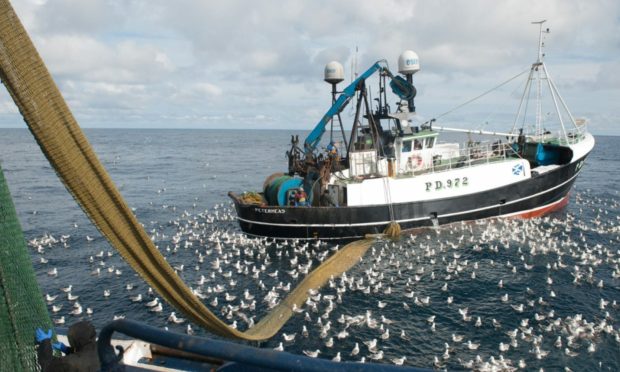An industry chief has warned Scotland’s trawlermen should not be “demonised” for their key role in feeding the nation.
Scottish Fishermen’s Federation chief executive Elspeth Macdonald also criticised potential conservation measures which could make seafood a “luxury product”.
She was speaking at the organisation’s 50th anniversary annual dinner at Edinburgh Castle last night and used the event to champion the sector’s low carbon footprint.
Ms Macdonald said critics of the industry failed to recognise the climate credentials of Scottish fish and shellfish compare “very favourably” to other forms of food production.
Fish also good for our health, SFF boss says
She added: “Seafood is not only extremely good for our health but scientifically proven to have lower greenhouse gas emissions than all other forms of animal protein and lower even than some forms of plant production.
“You can’t produce any food without some sort of impact, but people have to eat. The alternative is starvation.
“Like any industry, the fishing sector isn’t perfect – there will always be things that we can do differently or better.
“But we don’t deserve the picture that some often paint of us, and Scotland’s fishermen must not be demonised for going about their legitimate business of putting healthy, low emission food on people’s plates.”
And she urged the Scottish Government to develop “practical policies based on pragmatism, not idealism”.
“We can and we will work with government on sensible, properly developed policies for fisheries management and for nature conservation, she said, adding: “We mustn’t go down extreme roads that damage our nation’s ability to produce food.
“The same is true of the conflict between space in our seas for offshore energy and space for food production. The public have told us they think food security is as important as energy security. We must protect fishing’s space in our seas.
Losing our domestic fish production, either by accident or design, would be an unnecessary tragedy.”
“Otherwise, all we do is offshore our food production to other places. Places without the highly developed and sophisticated fisheries management that we have here.
“Losing our domestic fish production, either by accident or design, would be an unnecessary tragedy, and could leave us vulnerable in a world that could become less stable and more volatile in future.
“Nor should we drive our fisheries management in ways that make seafood a luxury product that only the affluent can afford. Despite what some NGOs (non-gvernmental organisations) would have us believe, we’re not going to feed the world on hand-dived scallops or creel-caught cod.”
Ms Macdonald said the industry was successful because it has adapted over many years to meet the needs of a wide range of consumers in different markets.
“Of course Scotland’s wonderful seafood can be a luxury product,” she said, adding: “But it shouldn’t only be that.
Looking to the next 50 years, Scotland’s fishing industry must be allowed to thrive, and continue to produce climate-smart, sustainable healthy food from renewable, well-managed fisheries – food that is rightly in high demand both at home and beyond.”
Fishers face sea ‘squeeze’
Guests included Scottish Rural Affairs Secretary Mairi Gougeon who highlighted policy support for the industry amid growing concerns about a “spatial squeeze” in Scotland’s seas.
Fishers are worried that a large number of wind farms planned for the North Sea may threaten their livelihoods.
There are also lingering fears about the eventual introduction of controversial Highly protected Marine Areas, despite the government doing a U-turn over them earlier this year.



Conversation